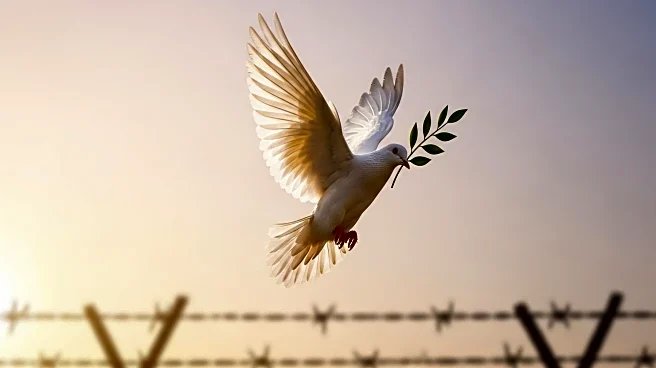What's Happening?
Hamas has agreed to release hostages as part of a ceasefire initiative aimed at ending the ongoing conflict with Israel. According to ABC News, the agreement comes after intense negotiations and international pressure to resolve the humanitarian crisis resulting from the Israel-Hamas war. The ceasefire is expected to facilitate the safe return of hostages and provide a temporary halt to hostilities, allowing for humanitarian aid to reach affected areas. The move is seen as a significant step towards de-escalating tensions in the region, although the long-term resolution of the conflict remains uncertain.
Why It's Important?
The release of hostages and the initiation of a ceasefire are critical developments in the Israel-Hamas conflict, which has had widespread implications for regional stability and international relations. The humanitarian impact of the conflict has been severe, with numerous casualties and significant displacement of civilians. The ceasefire provides an opportunity for humanitarian organizations to deliver much-needed aid and support to affected populations. Additionally, the agreement may serve as a foundation for further diplomatic efforts to achieve a lasting peace in the region, potentially influencing U.S. foreign policy and international diplomatic strategies.
What's Next?
The next steps involve monitoring the implementation of the ceasefire and ensuring the safe release of hostages. International stakeholders, including the United States, are likely to continue diplomatic efforts to support a sustainable peace process. The situation remains fluid, with potential challenges in maintaining the ceasefire and addressing underlying issues that have fueled the conflict. Continued engagement from global leaders and organizations will be crucial in navigating the complexities of the situation and working towards a comprehensive resolution.
Beyond the Headlines
The ceasefire and hostage release highlight broader ethical and humanitarian concerns associated with armed conflicts. The situation underscores the importance of international law and human rights in conflict resolution. Long-term implications may include shifts in regional alliances and the role of international bodies in mediating disputes. The development also raises questions about the effectiveness of diplomatic interventions and the responsibilities of global powers in addressing humanitarian crises.










